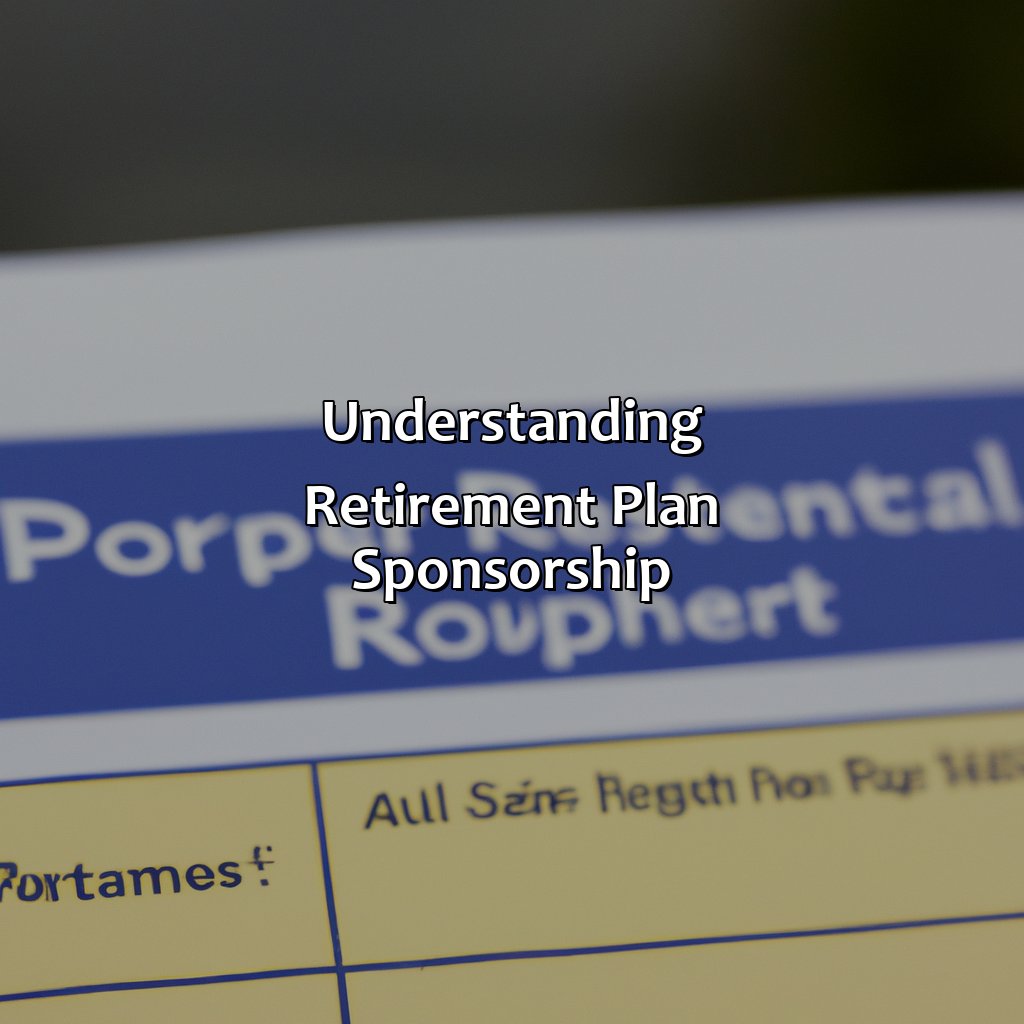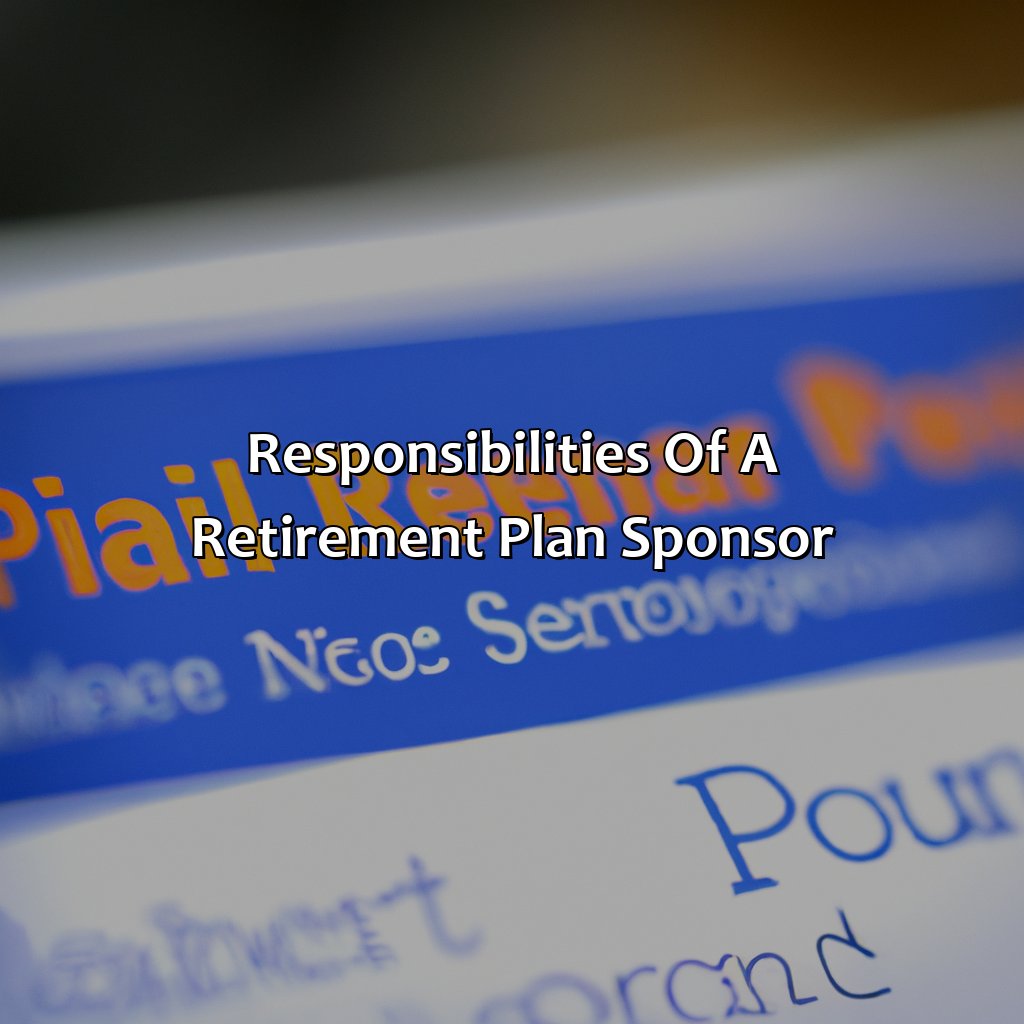What Is A Retirement Plan Sponsor?
Key Takeaway:
- A retirement plan sponsor is an entity, typically an employer or a union, that establishes and maintains a retirement plan for the benefit of its employees or members.
- The responsibilities of a retirement plan sponsor include selecting and monitoring investment options, ensuring compliance with government regulations, and educating employees about retirement benefits.
- Retirement plan providers play a key role in record-keeping and administration, as well as investment management.
- Retirement plan sponsors should be aware of their fiduciary duty and liability, choose the right retirement plan provider, and encourage employee participation and engagement in order to optimize the benefits of the retirement plan.
Are you wondering how to set up and manage a retirement plan for your business? Retirement plan sponsors play a critical role in this process. You are in the right place to learn about the responsibilities of the plan sponsor, and what you need to know.
Understanding Retirement Plan Sponsorship
Retirement plan sponsorship is the act of initiating and managing retirement plans for employees by an employer. It includes selecting and providing investment options and facilitating plan administration. A retirement plan sponsor is responsible for designing, funding, and ensuring compliance with legal regulations. The sponsor also chooses the plan’s trustee or custodian who holds the funds on behalf of the participants. In essence, plan sponsors act as fiduciaries, holding a legal responsibility to act in the interests of their employees.
Plan sponsors must adhere to various regulatory and administrative requirements concerning employee eligibility, vesting, contribution limits, and compliance testing. They must also provide participants with communication materials outlining the plan’s benefits, risks, fees, and investment performance in a clear and concise manner. This allows participants to make informed decisions about their retirement investments.
One significant factor in retirement plan sponsorship is the Employee Retirement Income Security Act (ERISA) of 1974, which governs private-sector retirement plans and establishes standards of conduct and disclosure requirements for plan sponsors and fiduciaries.
A landmark case in retirement plan sponsorship was the 2015 Supreme Court decision in Tibble v. Edison, where the plaintiffs argued that their plan’s sponsor had breached its fiduciary duty by offering higher-cost mutual funds when lower-cost alternatives had become available. The court ruled in favor of the plaintiffs, and the case affirmed the responsibility of plan sponsors to monitor the investment options of the plans they offer and make appropriate changes when necessary.

Image credits: retiregenz.com by Adam Woodhock
Definition of Retirement Plan Sponsorship
Retirement plan sponsorship refers to an employer who establishes and maintains a retirement plan for their employees. In other words, the retirement plan sponsor is responsible for administering the plan and ensuring that it complies with the regulations set forth by the government. The sponsor can be a corporation, partnership, individual, government agency, or nonprofit organization. Retirement plan sponsorship is a crucial aspect of employee benefits and helps individuals plan for their retirement.
One of the key responsibilities of the retirement plan sponsor is to choose a reliable investment manager to oversee the plan’s assets. The plan sponsor is also responsible for ensuring that employees are provided with sufficient information regarding the plan, including its features, benefits, and any changes.
It is worth noting that the retirement plan sponsor is fiduciary, meaning that they must act in the best interests of the plan participants. This means the plan sponsor must make decisions that are in the best interest of plan participants and beneficiaries, rather than their own interests.
According to a survey conducted by the Employee Benefit Research Institute, over 80% of Americans are covered by a retirement plan at their workplace, highlighting the importance of retirement plan sponsorship.

Image credits: retiregenz.com by Joel Jones
Responsibilities of a Retirement Plan Sponsor
You must understand your role as a retirement plan sponsor. To do this, you need to:
- Choose and observe investment options.
- Adhere to government regulations.
- Educate employees on retirement benefits.
This way, you can manage your role and give your employees a dependable, safe retirement plan.

Image credits: retiregenz.com by Yuval Jones
Selecting and Monitoring Investment Options
As a Retirement Plan Sponsor, it is essential to make informed choices and keep track of investment alternatives available for plan participants. Analyzing strategies to choose and supervise investments is best done by staying up-to-date with market trends, reviewing performance metrics, and adopting a systematic approach.
In today’s volatile stock market, selecting suitable investment options requires vigilant evaluation of portfolio allocation, expenses, past performance metrics, active management styles and adhering to various regulatory compliance requirements. Investing in mutual funds or Exchange-Traded Funds (ETFs) can further help in diversifying plans across different assets classes.
Furthermore, Sponsorship investments should align with the goals of plan participants. It is thus crucial that they offer financial education tactics promoting positive outcomes on employees’ finances effectively. Sponsors must enhance communication policies to mitigate risks associated with participant misinterpretation of their retirement benefit options.
A 1974 ruling by the Employee Retirement Income Security Act (ERISA) explicitly addressed fiduciary responsibilities under pension plans while maintaining oversight over assets entrusted upon them by employees. Their role is critical in ensuring employees receive significant benefits from their pension contributions during their retirement tenure.
To sum up, Selecting and Monitoring Investment Options is but one responsibility under the extensive list of duties Retirement Plan Sponsors undertake daily. With ever-changing regulatory obligations surrounding sponsoring a retirement plan for employees to prepare for retirement successfully, organizations must ensure they fulfill them appropriately insuring Participants security throughout their golden years.
Government regulations are like traffic lights- you may not always agree with them, but it’s best to follow them to avoid a retirement plan accident.
Ensuring Compliance with Government Regulations
As a retirement plan sponsor, it is essential to ensure that all government regulations pertaining to retirement plans are complied with. This involves complying with many different regulatory requirements set forth by various departments of the government.
One important aspect of compliance is ensuring that the plan meets all federal requirements, such as monitoring the employee’s eligibility status and limitations on contributions. Employers also need to make sure that their employees receive sufficient information regarding their plan options and distribution rights. In addition, sponsors need to be able to prove that they have followed these regulations should they ever be audited.
Another critical part of ensuring compliance is adhering to state laws regarding retirement plans. Each state has different rules about how plans are administered, funded and tax considerations, so it’s crucial for employers to understand all of these nuances within their jurisdiction.
In short, keeping up-to-date and actively following federal and state regulations is vital to being an effective retirement plan sponsor. Failure to comply can not only lead to significant fines but also disgruntle employees who negatively affect the company.
Some suggestions for staying compliant include educating oneself about current laws through seminars or hiring a professional in the field. Hosting periodic audits or internal compliance checks may help ensure any issues are resolved as soon as possible. Overall, building a strong compliance program with ethical practices in place will support one’s ability to stay compliant effectively.
Retirement savings: because who needs to eat when you have compound interest?
Educating Employees about Retirement Benefits
Retirement Plan Sponsors have the responsibility to educate employees about various retirement benefits. Educating them on benefits eligibility, contribution limits and investment options can help improve employee participation and engagement. Providing training for making informed investment decisions helps employees optimize returns.
In addition, understanding the difference between traditional and Roth IRAs, qualified plans (401(k), 403(b)) vs non-qualified plans (deferred compensation) is crucial in managing retirement savings accordingly. Employees should also be aware of the vesting period required to receive employer contributions.
Pro Tip: Encourage employees to start saving early for their retirement as it offers a longer time horizon to save and accumulate compound interest over time.
Retirement plan providers: because someone has to be responsible for convincing you to stop spending money on avocado toast.
Roles of Retirement Plan Providers
To comprehend the roles of retirement plan providers, check their duties. These include record-keeping, administration, and investment management. Plan sponsors aim to help you guarantee that your employees use their retirement benefits to the greatest degree possible. Therefore, knowing the different responsibilities of these providers is key to making informed decisions about your retirement plan.

Image credits: retiregenz.com by Joel Washington
Record-keeping and Administration
Maintaining accurate financial records and regulating the legalities of employee contributions and employer payments are integral parts of managing a retirement plan. The activities that encompass ‘Record-keeping and Administration’ include monitoring record-keeping systems, ensuring participants receive statements, preparing account balance reports, and communicating with plan administrators to ensure compliance.
| Task | Description |
|---|---|
| Employee Contributions: | Deducting salary from participant’s accounts in accordance with IRS requirements. |
| Deposit: | Ensuring timely deposit of employee contributions into the plan account. |
Ensuring tax forms are correctly addressed, meeting the administrative deadlines set by governing bodies, reporting contribution amounts, calculating earnings accumulation, maintaining beneficiary information, ensuring investments comply with ERISA rules are essential components required for successful Record-Keeping and administration.
Retirement plans became legally binding entities under The Employee Retirement Income Security Act (ERISA) launched in 1974. The act was adhered to after analyzing unethical practices of several bankrupt pension funds affecting over 30,000 employees insinuating funds were never registered as trust assets or kept accurately for distribution upon retirement.
Managing your retirement funds is like playing chess, you need to think strategically and always anticipate your opponent’s moves, in this case, the unpredictable market.
Investment Management
Investment management encompasses the process of overseeing and managing investments in a retirement plan to ensure their growth. This includes evaluating investment options, selecting suitable securities and monitoring their progress periodically.
Retirement plan providers offer a range of investment management services such as creating custom asset allocation strategies, conducting due diligence on investment managers and preparing periodic investment reviews. The primary goal is to help clients maximize their retirement savings by investing in a diversified investment portfolio that aligns with the client’s goals and risk tolerance.
Additionally, some retirement plan providers offer fiduciary services where they assume legal responsibility for managing an employer-sponsored retirement plan’s investments. This requires the provider to act in the best interests of the plan participants and ensure that the fees charged are reasonable.
According to a study by Vanguard, employees who participate in an employer-sponsored retirement plan saved three times more than those who didn’t have access to one. Investment management plays a crucial role in ensuring that these savings are adequately invested for maximum returns.
Retirement plan sponsors: because planning for your sunset years is as important as planning your next vacation.
Key Considerations for Retirement Plan Sponsors
You must think of multiple components to make informed decisions about your company’s retirement plan. You should assess fiduciary duties and liabilities for efficient retirement planning. Also, pick the correct retirement plan provider and encourage employee involvement. These are essential!

Image credits: retiregenz.com by Yuval Washington
Fiduciary Duty and Liability
As a retirement plan sponsor, it is your legal obligation to fulfill your fiduciary duty and avoid any liability that may arise from your actions or inactions. This includes making decisions in the best interest of plan participants.
In meeting your fiduciary duty, you must administer the plan with care, diligence, and prudence. You must also ensure that investments are diversified and fees are reasonable. Additionally, you should regularly monitor service providers and evaluate their performance.
Failure to meet these obligations can result in costly legal battles and penalties for the sponsor’s organization. As such, it is crucial to understand the potential risks associated with sponsor responsibilities.
It’s important to note that even though fiduciary duties are legally required under ERISA regulations, some sponsors may have additional contractual obligations imposed by vendors or service providers.
According to Forbes magazine, “A recent survey found that nearly 80% of participants do not fully understand what their 401(k) fees were and how they will affect long-term savings.”
Find a retirement plan provider with a better track record than your last ex, because you don’t want your retirement to end in heartbreak.
Choosing the Right Retirement Plan Provider
When selecting a suitable provider for your retirement plan, it is crucial to consider various factors such as the fees, investment options, and employee education. To make an informed decision, employers must analyze their company’s financial goals and compare them with the advantages and disadvantages of different providers. It is also important to ensure that the chosen provider complies with regulatory requirements and that they offer flexibility when changing providers.
Another critical factor to consider is the level of customer support provided by the retirement plan provider. Employers should evaluate their communication channels, responsiveness, and expertise in addressing specific concerns. With good customer service, problems can be addressed promptly without negatively affecting employees’ financial plans or burdening employers with additional responsibilities.
Employers must also consider their fiduciary duties when choosing a provider. Fiduciary duties refer to the legal obligation to act in the best interest of beneficiaries. In doing so, employers must assess all available options transparently and disclose any potential conflicts of interest.
In a recent case study, an employer failed to regularly review their retirement plan providers’ fees and investment options for over a decade, leading to excessive fees charged to employees. The employer was sued for breach of fiduciary duties and had to pay damages worth millions of dollars. This story emphasizes why it’s essential to choose the right retirement plan provider and regularly review it to avoid making costly mistakes.
To avoid missteps like this one, it’s imperative for companies to select retirement plan providers that have excellent value propositions that align well with their business needs. Furthermore, companies need providers who are adept at managing risk while providing robust benefits packages at reasonable costs. Doing so will allow employees to retire with confidence in their financial futures while ensuring compliance with regulatory requirements from governing bodies like ERISA (Employee Retirement Income Security Act).
Employee Participation and Engagement
Encouraging employee involvement in retirement planning is a crucial step for Plan Sponsors. Providing personalized finance education, rewarding employee savings and investing for the long-term can increase participation rates, making them feel valued and respected by their employer. By supporting their employees in financial planning, plan sponsors can ensure the workforce is engaged and happy.
Implementing auto-enrollment and auto-escalation to help employees save more as their salary grows gradually over time will encourage participation. Specifically-designed savings programs that offer unique incentives will also equip participants with the confidence to save money actively. Ensuring investment education is available, interactive, and simple is also essential.
Incorporating digital tools that provide a quick assessment of an individual’s financial situation can lead an employee down a clear path towards retirement readiness. Encouraging them to participate in on-site group meetings or webinars with professionals who are experts in investment management can be a game-changer.
Assisting workers with planning their financial futures is an excellent way for employers to demonstrate their support of their staff members’ well-being and empower them to achieve financial success while building loyalty towards your business that lasts beyond the years they work for you. Therefore it is essential for plan sponsors always to take the right step forward when designing retirement plans to ensure maximum engagement from the workforce.
Five Facts About Retirement Plan Sponsors:
- ✅ Retirement plan sponsors are responsible for selecting and managing a retirement plan for their employees. (Source: Investopedia)
- ✅ Plan sponsors have fiduciary responsibilities under the Employee Retirement Income Security Act (ERISA) to act in the best interests of plan participants. (Source: IRS)
- ✅ Plan sponsors can be individuals, businesses, or organizations that offer retirement plans including 401(k), pension, and profit-sharing plans. (Source: U.S. Department of Labor)
- ✅ Retirement plan sponsors may partner with third-party administrators (TPAs) to handle plan administration and compliance tasks. (Source: Forbes)
- ✅ Plan sponsors must regularly review their plan’s performance and make necessary adjustments to ensure it remains competitive and compliant. (Source: The Balance)
FAQs about What Is A Retirement Plan Sponsor?
What is a retirement plan sponsor?
A retirement plan sponsor is an entity, typically an employer or business owner, that establishes and maintains a retirement plan for the benefit of its employees or members.
What are the responsibilities of a retirement plan sponsor?
A retirement plan sponsor has several responsibilities, including selecting and monitoring plan investments, ensuring compliance with government regulations, educating employees about the plan, and making sure the plan operates in the best interest of the participants.
How does a retirement plan sponsor choose a plan provider?
A retirement plan sponsor typically selects a plan provider based on several factors, including the provider’s reputation, services offered, fees charged, and the provider’s ability to support the sponsor in managing the plan.
Can a retirement plan sponsor be held liable for plan errors?
Yes, a retirement plan sponsor can be held liable for plan errors. As the plan sponsor, it is their responsibility to ensure the plan is operating in compliance with regulations and operating in the best interest of the plan’s participants.
What happens if a retirement plan sponsor wants to terminate the plan?
If a retirement plan sponsor wants to terminate the plan, they must follow specific steps to ensure a smooth termination process. This includes notifying participants, filing necessary paperwork, and distributing plan assets according to plan provisions.
How can a retirement plan sponsor ensure their plan is successful?
A retirement plan sponsor can ensure their plan’s success by regularly monitoring the plan’s performance, providing education and support to participants, and seeking guidance from plan professionals as needed.



